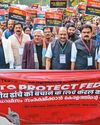Swagger Vs Sass

YOU are lounging on your couch, sipping hot koffee, watching a glamorous reality show. Karan Johar and a bunch of celebrities—seven women, three from Delhi and four from Mumbai—are discussing, well, everything that the rich generally talk about, at a high-end Mumbai restaurant. There is fun and banter and a lot of leg pulling. The mood (predictably) changes, and there is (scripted) tension in the air. And then something happens that makes you keep your koffee aside. The conversation suddenly feels real, genuine. It feels very you.
“I’m on medication every morning and I have an SOS medication every evening. The idea of going to a party, a social event or a crowd scares the daylights out of me. I throw up in the mornings when I think about it. My knees shake. And yet, I have to go outside, face cameras and smile,” says Johar.
It was rather startling to see one of the most popular directors of Bollywood—known for his penchant for talking directly into the camera—share pearls of wisdom on how to cope with mental health issues in the third season of Fabulous Lives of (Vs) Bollywood Wives. This tailored vulnerability seems to be the running theme in the entire season—which has Bollywood wives of Mumbai and fabulous lives from Delhi reveal aspects of their personal lives.
Reality television has had a solid run in the entertainment scene for nearly two decades now. Ranging from music, dance and talent shows, to cooking, quizzes and adventure sports—the audience has now seen it all. Regional industries, too, have replicated these shows across the country and tasted popularity. Though shows like Bournvita Quiz Contest or Antakshari had started off quite early, reality TV really caught on only with the launch of Indian Idol in 2004 and Bigg Boss in 2006. Both the shows were based on popular reality TV formats from the UK and the US. Fabulous Lives, too, takes inspiration from the popular US-based reality show, Keeping Up With the Kardashians.
This story is from the {{IssueName}} edition of {{MagazineName}}.
Start your 7-day Magzter GOLD free trial to access thousands of curated premium stories, and 9,000+ magazines and newspapers.
Already a subscriber ? Sign In
This story is from the {{IssueName}} edition of {{MagazineName}}.
Start your 7-day Magzter GOLD free trial to access thousands of curated premium stories, and 9,000+ magazines and newspapers.
Already a subscriber? Sign In

10 Stunning Wedding Venues To Explore
IF YOU ARE DREAMING OF A WEDDING CELEBRATION FIT FOR ROYALTY, LOOK NO FURTHER THAN THESE PALACES AND FORTS ACROSS RAJASTHAN

The Arithmetic of Injustice
Delimitation will reduce Tamil Nadu, and by extension much of the south, to spectators in a democracy where they have long been equal stakeholders

A Southern Storm
“Women and children have no part in war, yet they pay the highest price.” —Leymah Gbowee, Liberian peace activist & Nobel Prize winner

Magical Places To Take Your Pheras
TAKE ADVANTAGE OF RAJASTHAN'S VIBRANT AND HAPPENING CITIES TO HOST PHOTOSHOOTS AND WEDDING EVENTS THAT WILL BE A FEAST FOR THE EYES

Winners' Loss
Delimitation will affect not only the non-NDA parties, but also NDA partners

South's Tax Revolt
The objection of southern states over tax devolution alludes to broader challenges in India’s federal structure exacerbated by the impending delimitation exercise

Bollywood Bliss
RAJASTHAN'S STORIED ROYAL HERITAGE AND SPECTACULAR LANDSCAPES MAKE IT ONE OF THE TOP DESTINATION WEDDING LOCALES IN INDIA. IF YOU WANT TO GET HITCHED BOLLYWOOD STYLE, CHECK OUT THESE AMAZING VENUES WHERE THE \"STARS\" HAVE ALIGNED

Star Wars
With old alliances fracturing and new ones being forged, the global order is not just shifting—it is being rewritten in real time

All the President's Men
Is the US reset with Russia due to the China factor?

Interminable Chaos
Is the ongoing global geopolitical security crisis ephemeral or a continuum?
